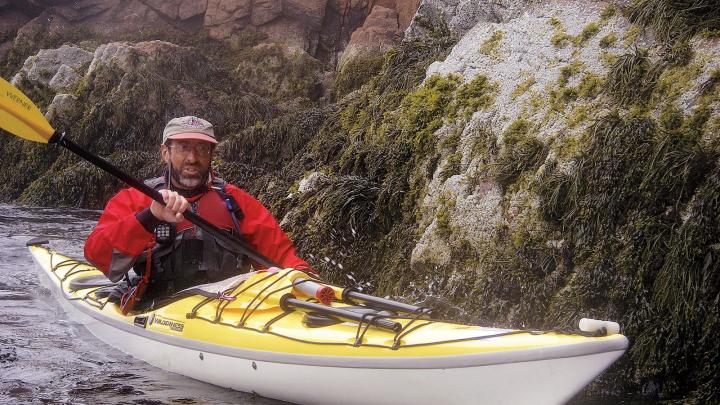We’re living in a smartphone world. It seems everyone’s roommate, professor, kid brother, and even grandmother lives, eats, and breathes for access to 4G (and good battery life). Ask (almost) anything of (nearly) anyone at (just about) any time, and her smartphone’s got the answer. Lose track of how to get to the doctor’s office, forget your appointment’s time, or need, indeed, to find a doctor, and your smartphone’s got your back. It hardly seems hyperbole to designate the smartphone the most revolutionary tool for the dissemination and acquisition of knowledge since Gutenberg’s storied press.
But as fun, helpful, and indispensible as our smartphones may seem, might they also be our biggest crutch? In his new book, Donner professor of science John Edward Huth, a high-energy physicist, argues just that.
In The Lost Art of Finding Our Way, Huth reexamines the post-smartphone world with an eye to the losses we have incurred in exchange for boundless information at our fingertips. The book is a fascinating guide to the “primitive” (and yet, we soon realize, incredibly sophisticated) techniques by which our forebears charted, measured, predicted, and navigated their place in space. Most important, Huth weaves through all his practical information the argument that in order to maintain touch with our natural world, we must relearn and retain direct understanding of the natural world. Humans’ loss of our intrinsic, visceral connection to nature would be regrettable—and, in some cases, tragic.
Huth’s story starts with kayaking. An avid paddler, he became disoriented in fog several years ago while exploring the waters around Maine’s Cranberry Islands. He had neither map nor compass. Using his knowledge of primitive navigation techniques—then quite rudimentary, though well beyond the average smartphone addict’s—Huth called up a mental map of the area, noted wave angles and incidences to determine where the coast lay, listened for shore-crashing waves, and counted out time as he paddled straight toward his anticipated landfall. Eventually he made it. Rattled, yet pleased with his use of general navigational techniques, Huth decided to study offshore-navigation techniques more carefully before next setting out.
Several months later, Huth again found himself paddling in fog, this time off the coast of Cape Cod. Better prepared by his study, he had noted wave, shore, wind, and sound patterns before setting out, and thus, when the fog hit, he navigated home without worry. But the next day, he read in the newspaper about two other Cape Cod kayakers who had not been so lucky. Sarah Aronoff, 19, and Mary Jagoda, 20, had been enveloped in the same fog; they never made it back to shore. Huth surmises that, equipped with neither compass and map nor his knowledge of navigation techniques, the young women became truly lost. This tragedy convinced Huth that he needed not only to study primitive navigation for himself, but to get knowledge of those techniques to the smartphone-dependent public. The Lost Art of Finding Our Way is dedicated to the memory of Aronoff and Jagoda in the hope that it may educate other adventurers who someday find themselves lost.
Having deciding to share his navigation research at Harvard, Huth first crafted a freshman seminar. From there, the material grew into a General Education course, Science of the Physical Universe 26: Primitive Navigation. (SPU 26 shared many features of Harvard College’s longest-running course, Astronomy 2: Celestial Navigation, which is still offered, but was intended as a broad survey of navigational techniques and history, rather than an in-depth introduction to celestial navigation.)
I participated in the last iteration of “PrimNav” (as undergrads dubbed the popular class) before the book’s final editing. Not surprisingly, it closely mirrors the proceedings of the course. Huth begins with surveys of basic land navigation based on “dead reckoning” and progresses to the more sophisticated application of compasses and maps. From there, he examines celestial navigation via stars, sun, moon, and the horizon. He next heads seaward, discussing waves, tides, currents, wind, and sailing vessels. He also includes a long, informative section about weather. Interspersed throughout are narratives of navigation from other cultures—particularly those of Arab traders, Vikings, and Pacific Islanders.
In the age of “my world is my iPhone,” Huth’s book will provide most readers with new, useful, enlightening information—the space beyond the screen, as it were. In fact, I would rather have read the book than taken the course: when curiosity is your motivating force, you’d rather soak in the information than worry about assignments and grading. But class participation did have its merits. Our assignments sent us out into the Cambridge streets, across the Charles River bridges, and up to both of Harvard’s observatories—successfully putting the practical back into science.
My own experience of the world has certainly changed since I spent a semester studying primitive navigation. Now, I always orient myself to the cardinal directions based on the sun’s location and the time of day. I notice the passing of the seasons based on the angle of the sun’s ascent. I can track the approach and arrival of warm fronts and cold fronts, and understand what sorts of winds and precipitation these weather patterns will bring. I can entertain a nighttime crowd by pointing out constellations beyond Orion and the Dippers. And I am confident that when I am out in a sailboat (my own maritime hobby), I, too, will have the tools to avoid getting lost.
The Lost Art of Finding Our Way should be a field guide, not merely an armchair exercise. As you read it, you must try its techniques out in the world. If Huth has done his job, and I think he has, then all his readers will turn this valuable book’s last page feeling similarly enlightened and confident about setting forth into Cambridge, across land, and even out to sea. If you become lost some day—or, God forbid, your phone’s battery runs out—there will be nothing but your eyes, ears, and mind to guide you home.








